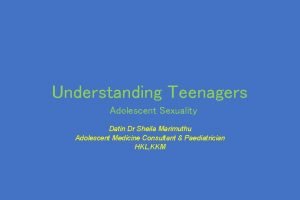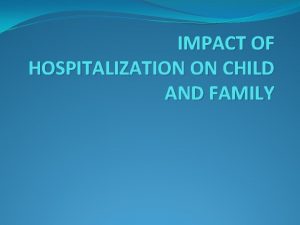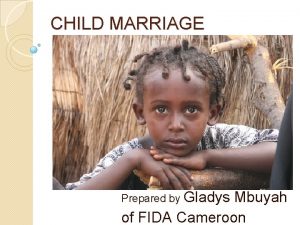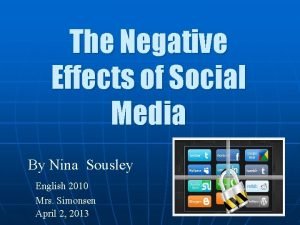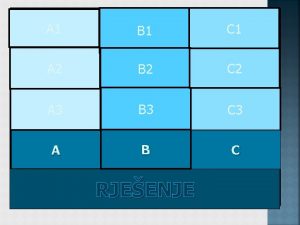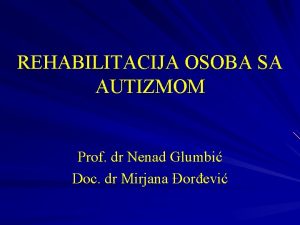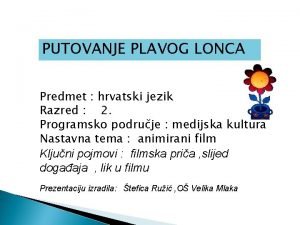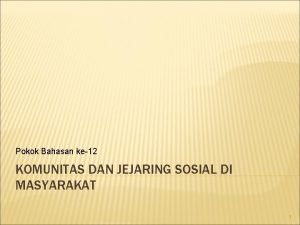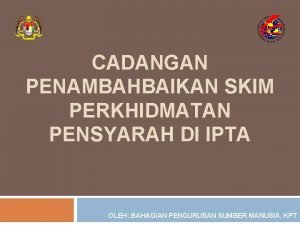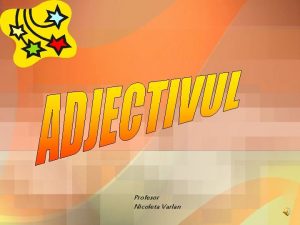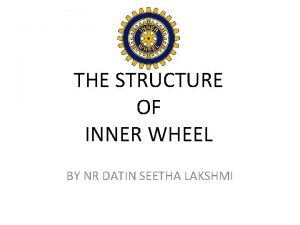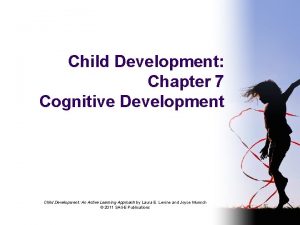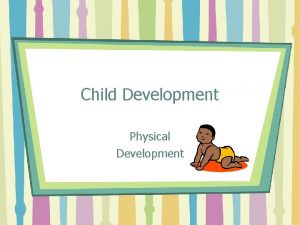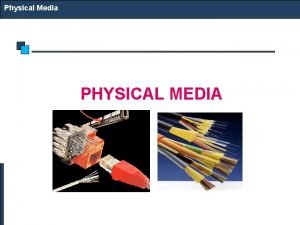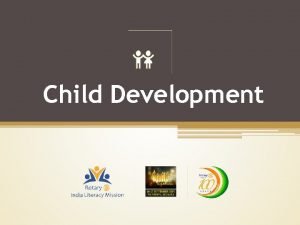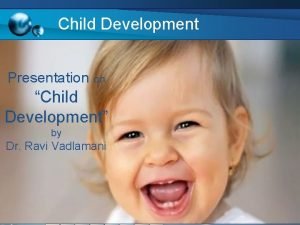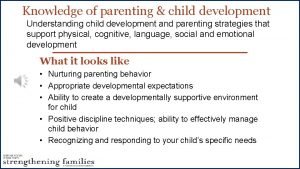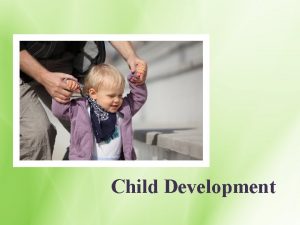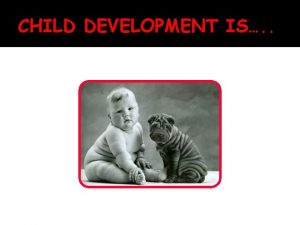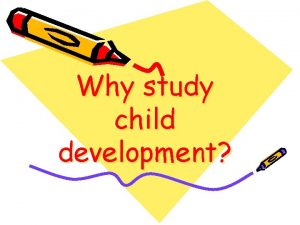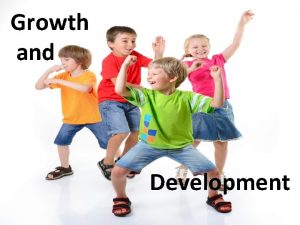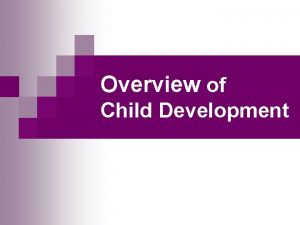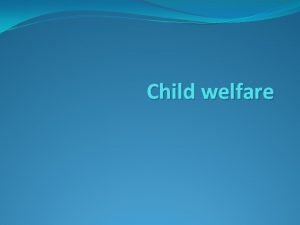Effects of Media on child development PROFESOR DATIN


























- Slides: 26

Effects of Media on child development PROFESOR DATIN DR MARIANI MD NOR FAKULTI PENDIDIKAN UNIVERSITI MALAYA

Objectives q Introduction q To understand the different kinds of media. q To analyse the impact of media on various aspects of q development. q To identify positive and negative impact of media on children. q Parental influence in children media influence. q How to incorporate good mass media habits in children.

Introduction q Extreme caution in the choices we make for our children to develop skill, habits and moral and social values to grow up to be good human beings. q Understand the background to understand the impact. q Getting a perspective in how we can influence good media habits for appropriate child development.

DIFFERENT KINDS OF MEDIA Print Media Electronic Media New Age Media

IMPACT OF MEDIA ON VARIOUS ASPECTS OF DEVELOPMENT q It is crucial to understand how media impacts a child development to be able to control the impact, at various developmental aspects and how media effects each area of development. q the psychological changes a child goes through due to the impact of media.

IMPACT OF MEDIA ON VARIOUS ASPECTS OF DEVELOPMENT q Cognitive Development q This is the child's ability to learn and solve problems. q For example, this includes a two-month-old baby learning to explore the environment with hands or eyes or a five-year-old learning how to do simple math problems. q Social and Emotional Development q This is the child's ability to interact with others, including helping themselves and self-control. q Examples of this type of development would include: a six-weekold baby smiling, a ten-month-old baby waving bye-bye, or a five -year-old boy knowing how to take turns in games at school.

IMPACT OF MEDIA ON VARIOUS ASPECTS OF q Speech and Language Development DEVELOPMENT q This is the child's ability to both understand use language. q For example, this includes a 12 -month-old baby saying his first words, a two-year-old naming parts of her body, or a five-yearold learning to say "feet" instead of "foots". q Fine Motor Skill Development q This is the child's ability to use small muscles, specifically their hands and fingers, to pick up small objects, hold a spoon, turn pages in a book, or use a crayon to draw. q Gross Motor Skill Development q This is the child's ability to use large muscles. q For example, a six- month-old baby learns how to sit up with some support, a 12 -month-old baby learns to pull up to a stand holding onto furniture, and a five-year- old learns to skip.

IMPACT OF MEDIA ON VARIOUS ASPECTS OF Media. DEVELOPMENT impact on Emotional and Social Development q Children at an infant stage do not understand emotions or social behaviour. q Surrounding environment determines the perception of a set emotional reaction and social interaction. q Type of content children are exposed to makes a difference. q Children in non social, instead of social and physically active state, due to Mass Media.

IMPACT OF MEDIA ON VARIOUS ASPECTS OF DEVELOPMENT Media Fear and Anxiety q Children can not only witness and share emotions experienced by media characters, but also respond directly to emotionally charged events depicted in the media. q Monster House, Corpse Bride, and Harry Potter and the Order of the Phoenix are just a few examples of horror-filled content that is targeted to children. q Classic Disney films such as Bambi, and The Lion King can also be upsetting to very young children.

IMPACT OF MEDIA ON VARIOUS ASPECTS OF DEVELOPMENT Long Term Fears and Phobias q Watching more television a day risk for scoring these trauma symptoms. than six hours of put children at greater in the clinical range of q A survey of nearly 500 parents of elementary school children found that the children who watched television just before bedtime had greater difficulty falling asleep, were more anxious at bedtime, and had higher rates of nightmares.

IMPACT OF MEDIA ON VARIOUS ASPECTS OF DEVELOPMENT q Preschoolers and younger elementary school children (two to seven years of age) are most frightened by characters and events that look or sound scary. q This pattern is consistent with younger children's perceptual dependence, their tendency to fixate on visual and auditory cues rather than more conceptual information such as the motives of a character.

IMPACT OF MEDIA ON VARIOUS ASPECTS OF DEVELOPMENT q Older elementary school children (eight to twelve years of age) are frightened more by scenes involving injury, violence, and personal harm. q Older children also are more responsive than younger children are to events in the media that seem realistic or could happen in real life. q This heightened responsiveness is consistent with their more mature understanding of the distinction between fantasy and reality. q Several studies have found, for example, that older children or teens (age eight to twelve) are more frightened by television news than are younger children.

IMPACT OF MEDIA ON VARIOUS ASPECTS OF DEVELOPMENT Media and Moral Development q Moral development in children follows a predictable developmental path. q Moral reasoning becomes more flexible and “other” oriented. q Extensive viewing of television violence can alter children's views about the acceptability of violence and perhaps even hinder the development of their moral reasoning. q Cheating, lying, stealing, yelling, cursing can be perceived as acceptable behaviour by children. q Media can cause confused moral reasoning. q Some programs and genres can enhance moral development.

IMPACT OF MEDIA ON VARIOUS ASPECTS OF DEVELOPMENT Media and Antisocial Behavior q On an average a child views 200, 000 violent acts on television by the age of 18. q Kids become desensitized to violence and more aggressive. q Violence is often promoted as a fun and effective way to get what you want.

IMPACT OF MEDIA ON VARIOUS ASPECTS OF DEVELOPMENT Media and Antisocial Behavior q Many violent act are perpetrated by the “good guys” whom kids have been taught to admire. q Even though kids are taught by their parents that it's not right to hit, television says it's OK to bite, hit, or kick if you're the good guy. This can lead to confusion when kids try to understand the difference between right and wrong.

IMPACT OF MEDIA ON VARIOUS ASPECTS OF DEVELOPMENT Media and Antisocial Behavior q Behaviour problems, nightmares, and difficulty sleeping may follow exposure to media violence. q Young kids are particularly frightened by scary and violent images. q Simply telling kids that those images aren't real won't console them, because they can't yet distinguish between fantasy and reality.

IMPACT OF MEDIA ON VARIOUS ASPECTS OF DEVELOPMENT Media and Antisocial Behavior q Violent television programming contributes to both short- term and long-term increases in children's aggressive behaviour. q Video games act as fantasy violence. q Exposure to violent media results in Risky behaviour.

IMPACT OF MEDIA ON VARIOUS ASPECTS OF DEVELOPMENT Risky Behaviour q Smoking q q q q Drinking Drugs Ragging Eve teasing Sexual acts Grooming Driving Fighting Language Emotions Aggression Copy cats Health

POSITIVE AND NEGATIVE IMPACT OF MEDIA ON CHILDREN Positive Increase in academic and social skills/exposure Children viewing educational programming have higher grades. Improves reading writing grasping. Audio and visual learning. Negative Risky behaviour Phobias and fears Certain programmes are prepared for children for real life situations. Understanding the world around us. Obesity, lack of physical activities Helps develop skills like critical thinking, writing, public speaking, imagination and creativity Inappropriate language and manners Develops gross motor skills. Video games help enhance gross motor skills. Aggressive behaviour lack of actual real experiences

PARENTAL INFLUENCE IN CHILDREN MEDIA INFLUENCE q Parents play a key role in how media affects children. q Your choices matter. q Media is not just entertainment but a vast source of information. q Guidance and messages reinforcement of in differed portrayals can enhance the child’s pro social Learning q Be the boss q Helping Content. children understand the

HOW TO INCORPORATE GOOD MASS MEDIA HABITS IN CHILDREN The art of incorporating good strategy q Constant monitoring – Monitoring the quality of media that your child is exposed to is crucial. Avoid exposing children to violent Aggressive, scary, emotionally disturbing and any such other inappropriate media. q Rating - Keep a check on the media rating to ensure children are exposed to media which is age appropriate. q Guidance – When there is proper guidance and explanation to an action the child will be able to understand the messages better. q Be a role model – Children learn from their surroundings and people close to them. Especially parents.

The art of incorporating good strategy q Make rule and stick to them – As parents putting your foot down will only help your child’s development. Do not compromise on that. Stick to the rules. q Choose wisely – Depending on the development stage of your child choose media exposure that will help the developmental aspects of your Child. For example: Sesame street, Barney, Blue etc are series that are Educative and fun for children. q Screen time – Children need both physical and mental activities for appropriate development. Limit screen time. Another way of diverting children from media to productive activities is by letting them earn the screen time.

The art of incorporating good strategy q Respect for Technology – With ipods and tabs its not possible to keep kids away from technology however it can be control and directed to positive development. q Restricted viewing – Put a child lock on the channels you think inappropriate for your child. q Reality from Fantasy – Superman flies, spider man climbs walls and Amir Khan can ride a bike on anything even water and wire. A child does not understand the real message and emotion in all given instances. Explaining and even showing real from fake and fantasy helps the child understand the messages better.

The art of incorporating good strategy q Communication – Communicating with your child helps you understand what understanding they develop from certain media exposure which will help you guide them better. q Do not use high-tech devices as Babysitters – With more nuclear families today is understandable that stress gets to us. However in no given situation should a tech device be used as a babysitter. q Creative and educational development - With exposure to so many q avenues through media a positive direction will go a long way. Find what interests your child and develop on that through media and internet. If your child is inquisitive you can look up appropriate educative video on the internet. You can use internet to assist with homework or questions the child is inquisitive about.

The art of incorporating good strategy q Family time – Media can be very effectively used for quality family time as well. It can be used to have encouraging discussion and sharing of knowledge and views. One can use this time to educate the child about the cons of media and how to use media effectively instead of being overwhelmed by it.

Summary q To sum it up Media has both positive and negative implication on children. q These cannot be eradicated however we can definitely ensure that we encourage the positive aspects and control the negative for our children to understand use the resources available for growth and not destruction of self being.
 Sex datin
Sex datin Impact of hospitalization on the child and family
Impact of hospitalization on the child and family Did gladys aylward marry
Did gladys aylward marry Left child right sibling tree
Left child right sibling tree Social media good and bad effects
Social media good and bad effects Positive effects of primate cities
Positive effects of primate cities Profesor milorad jankovic
Profesor milorad jankovic Profesor magdalena strus
Profesor magdalena strus Profesor baltazar sreća u dvoje
Profesor baltazar sreća u dvoje Profesor nicolae cretu
Profesor nicolae cretu Profesor itk
Profesor itk Glumbic fasper
Glumbic fasper Plavi lončić priča
Plavi lončić priča 1www2
1www2 Perfil del profesor de religión
Perfil del profesor de religión Nebojsa pusara
Nebojsa pusara Don avelino la lengua de las mariposas
Don avelino la lengua de las mariposas Kewajiban khusus profesor
Kewajiban khusus profesor Konstitucioni izomeri
Konstitucioni izomeri Aportes del profesor ángel rubio en panamá
Aportes del profesor ángel rubio en panamá Fisa postului profesor itinerant de sprijin
Fisa postului profesor itinerant de sprijin Profesor descubridor
Profesor descubridor Gaji profesor madya ds54 2020
Gaji profesor madya ds54 2020 La web del profesor
La web del profesor Hormat pengakap
Hormat pengakap Felul adjectivelor prin care se exprima
Felul adjectivelor prin care se exprima El profesor holland
El profesor holland
